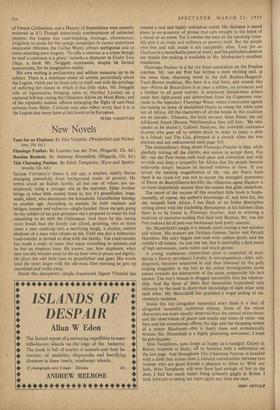SIGNOR VITIDRINI'S theme is old age, a sombre, stately theme
emerging powerfully from background music of poverty. He writes about an Italian family, all but one of whom are un- employed, using a younger son as the narrator. Elder brother brings in what little money there is; but it's grandfather, huge, senile, silent, who dominates the household. Grandfather belongs to another age. According to mother, he built viaducts and bridges, tunnels and railways—single-handed. Once she gets going on the subject of his past greatness she's prepared to swear he had something to do with the Colosseum. And there he sits, eating more bread than the family can afford, grunting, two or three times a year creaking into a terrifying laugh, a clumsy, useless elephant of a man who refuses to die. Until one day a tubercular road-mender is invited to dine with the family. The road-mender has made a study of tunes that mean something to animals and he has an elephant tune. He knows, too, how elephants, when they are old, wander away to die on their own in peace and dignity. He plays his odd little tune to grandfather and goes. His words (and the tune) linger with the old man. One morning he gets up unassisted and walks away.
created a real and highly individual world. His dialogue is pared down to an economy of phrase that cuts straight to the heart of a mood or an event. Yet it retains the tone of the speaking voice. His plot is as crude and ordinary as poverty itself. But the people who live and talk inside it arc completely alive. Tune for an Elephant is a remarkable piece of work; and the publishers deserve our thanks for making it available in Mr. Mosbacher's excellent translation.
Flamingo Feather is a far cry from naturalism on the Pontine marshes. Mr. van der Post has written a most exciting and, at the same time, charming novel in the full Buchan-Haggard- Yeats-Brown tradition. His hero is a real hero, and sounds like one—Pierre de Beauvilliers is at once a soldier, an aristocrat and a brother to all good natives. A murdered Sindakwena prince sends him tight-jawed and determined from his Capetown vine- yards to the legendary Flamingo Water where Communist agents are raising an army of disciplined blacks to sweep the white man out of Africa. All the characters of all the books in this tradition are on parade: Utumwa, the loyal servant; Oom Pieter, the old Afrikaans friend (Bwana 'Ndabaxosikas they call him : 'He who speaks as he shoots'); Colonel Sandyssc, the erstwhile comrade-. in-arms who goes off to certain death in order to repay a debt to a friend; and The Girl, glimpsed in a church when she was thirteen and not rediscovered until page 319.
The extraordinary thing about Flamingo Feather is that, while gleefully ticking off the clichés, one comes to accept them. For Mr. van der Post writes with such pace and conviction and with so wide and deep a sympathy for Africa that his people become believable simply because he himself believes in them. If you accept the teeming magnificence of Mr. van der Post's bush there is no cause for you not to accept the strangled sparseness of Pierre de Beauvilliers's sex-life; the villainous agent Hankov is no more improbably sinister than the snakes that glide underfoot.
The secret of the success of this excellent little book is funda- mentally, of course, the author's knowledge of, and love for, the old, unspoilt bush Africa. I can think of no better descriptive writing about wild life (including Hemingway at his hairiest) than there is to be found in Flamingo Feather. And in reviving a tradition of narrative writing that died with Buchan, Mr. van der Post makes a lot of post-war excitement look pretty anxmic.
Mr. Bloomfield's jungle is a seaside resort during a wet autumn and winter. His masters are Graham Greene, Sartre and Patrick Hamilton. His story begins and ends with sudden death; and the middle's all misery. As you can see, this is inevitably a first novel of high seriousness, some talent and much gloom.
A young, unpleasant corporation clerk is suspected of mur- dering a blowsy provincial Lorelei. A newspaperman, older, self- disgusted, becomes interested in and then obsessed by the guilt surging sluggishly in the boy as the police investigations move nearer towards the destruction of the quiet, respectable life he's known. The boy's fiancée is dragged inexorably into the relation- ship. And the three of them find themsel■res hypnotised into intimacy by the need to share their knowledge of each other with eaeh other. Mr. Bloomfield has provided a tragic ending of un- necessary neatness.
Inside this not altogether successful story there is a deal of altogether successful incidental writing. Some of the minor characters are more cleanly observed than the central triumvirate; and the observation of places and smells and tones of voice—the bars and the corporation offices, the digs and the shopping streets
of a minor Blackpool—this is finely done and economically written. Mr. Bloomfield is a highly promising newcomer; I hope he gets happier.
Miss Templeton, now, keeps as happy as a sandgirl. Gaiety in Rome; suspense in Sicily; off to America with a millionaire on the last page. And throughout This Charming Pastime is handled


































 Previous page
Previous page